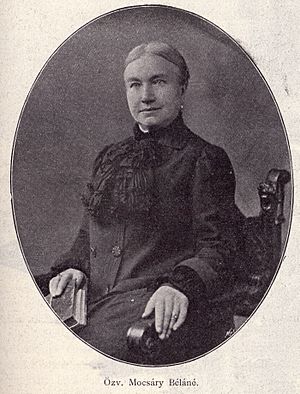Béláné Mocsáry facts for kids
Quick facts for kids
Béláné Mocsáry
|
|
|---|---|
 |
|
| Born |
Mária Fáy
21 October 1845 Pomáz, Hungary
|
| Died | 31 July 1917 Nagyfalva
|
| Nationality | Hungarian |
| Occupation | Traveler, writer, lecturer |
| Known for | Travel writing |
| Spouse(s) | Béla Mocsáry |
| Parents |
|
Béláné Mocsáry (1845–1917) was a Hungarian geographer and writer. She was one of the first people from Hungary to write a lot about her travels. She explored many places, including Europe, Asia, Africa, and North and South America. Sometimes, she was known as Mrs. Bélán Mocsáry, Mária Fáy.
Contents
Life and Journeys
Early Life and First Travels
Mária Fáy was born in Pomáz, Hungary, on October 21, 1845. Her parents, Ignác Fáy and Franciska Kenessey, owned land. Sadly, her mother died when Mária was just one year old. Her father and his former guardian, a writer named András Fáy, raised her. Her family's land helped pay for her education.
From ages eight to twelve, Mária lived in Pest. Then she moved back to her father's home in Pomáz. There, she learned several foreign languages, handicrafts, and how to play the piano. When she was 14, her father took her to Venice, Italy. This trip made her love travel, and she kept exploring for the rest of her life.
Marriage and Later Adventures
In 1862, Mária married Béla Mocsáry. She then took on her married name: Béláné Mocsáry Mária Fáy. She and her husband lived in a small village in Nógrád County. She enjoyed gardening there. In their free time, they traveled a lot. They visited countries like Switzerland, Italy, France, Belgium, England, and Germany.
Her husband died in 1890. Béláné Mocsáry had no children and never remarried. Instead, she rented out her properties and began writing about her travels.
Exploring New Continents
In January 1893, Mocsáry traveled with her sister to the Balkans and the Middle East. They visited Greece, Turkey, Palestine, and Egypt. They even went as far as Nubia on the Nile River. During this trip, she learned English, which helped her on future journeys.
A few months after returning home, she started her first solo trip. She wanted to see India, the Himalayas, and Ceylon (now Sri Lanka). This whole trip lasted three months. Her first book, India and Ceylon's Notes, came out in 1899. It had 80 photos she took herself. The book was re-released in 1901 and 1902 with more content. All the money from her books went to charities. These charities helped Hungarian families and children in need.
After some time at home, Mocsáry crossed the Atlantic Ocean. She traveled to North America twice. First, she visited the United States in 1896, including Alaska. Then, she went to Mexico in 1904. From Mexico, she had planned to travel around the world. But the Russo-Japanese War (1904–1905) closed that route. So, she went to South America instead. She visited places like Córdoba, Orizaba, Mexico City, Cuernavaca, Acapantzingo, Guanajuato, and Querétaro.
In her final years, Mocsáry lived on her property in Nagyfalva (now Mogersdorf, Austria). She passed away there on July 31, 1917. Some people called Mocsáry "the first Hungarian traveler." While this might not be fully accurate, she was certainly a very famous traveler of her time.
Hungarian Geographical Society
Béláné Mocsáry was a member of the Hungarian Geographical Society. This group encouraged her travels. When the society started in 1872, it allowed women to join. It claimed to be the first scientific group to do so. Mocsáry gave talks about her adventures to the society's members. The president of the society even asked her to speak.
Her Writings
Published Works
Béláné Mocsáry wrote many travel stories. These were published as newspaper articles and books. Her writings often included photos she took during her trips. Her articles appeared in newspapers like OrsvýgVilág (The Country and the World) and Magyar Sņalon (Hungarian Salon). She also wrote for the "Séták a nagyvilágban" (Strolls in the World) section of Uj idõk (New Times).
 | James Van Der Zee |
 | Alma Thomas |
 | Ellis Wilson |
 | Margaret Taylor-Burroughs |

